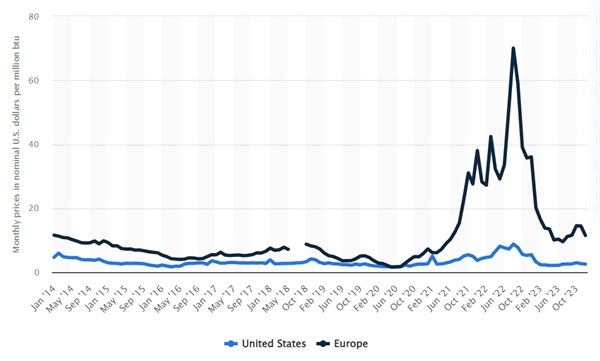
Gwede Mantashe is a strong advocate for developing the SA gas economy.
Key proposals include the introduction of new definitions, the promotion of orderly industry development, and enhancements to the national regulatory framework. These proposals will give the minister unprecedented authority to pass through gas projects as "integrated energy projects".
The department maintains that this legislation seeks to foster broad-based black economic empowerment, socio-economic development, and environmentally sustainable practices within the sector. It further acknowledges the need to adapt to new developments and emerging technologies in the gas industry – namely the green hydrogen value chain.
In this way it also aims to align the gas industry with new transportation technologies for natural and unconventional gases, which are not currently catered for in the existing Gas Act of 2001 (Act 48 of 2001).
Alexander Winning and Wendell Roelf 5 Jan 2024 This is a significant move towards modernising the sector and keeping pace with the aforementioned technological advancements, which will bring the proposed gas economy in line with what is seen in Europe.
Major concerns
Concerns are raised by the falling importance of gas in the EU, though. Wind and solar power generated a record 22% of the EU’s electricity in 2022, surpassing fossil gas (20%) for the first time and remaining above coal power (16%). However, the transition away from fossil fuels was temporarily halted due to dual crises in Europe’s electricity system.
A once-in-500-years drought swept across Europe, resulting in the lowest level of hydroelectric generation since the turn of the millennium.
At the same time France experienced unexpected outages in its nuclear plants just as German nuclear facilities were being decommissioned. These events created a significant shortfall in power generation, amounting to 185TWh, or 7% of Europe’s total electricity demand in 2022. Most of this gap was filled by increased wind and solar generation, coupled with a decrease in electricity demand.
However, the remaining deficit was met by ramping up fossil fuel generation.
Given that coal was more cost-effective than gas, it accounted for the majority of the increase, rising by 7% (+28TWh) in 2022 compared to the previous year. As a consequence, emissions from the EU’s power sector saw an uptick of 3.9% (+26 MtCO2) in 2022 compared to 2021.
Gas generation remained largely unchanged (+0.8%), and due to its higher cost relative to coal in 2021, there was no further transition from gas to coal in 2022.
It is widely predicted that the upcoming 2024 Ember European Electricity Review will report a record drop in gas use, with the 2023 report estimating that “fossil generation could plummet by 20% in 2023, double the previous record from 2020”.

Gas prices in US and EU. Source: Statista
Gas prices are falling
This downward pressure was based on the assumption taken from the extraordinary gas prices in the 2022 European winter. The gas price has since plummeted and, as more African resources come online, is predicted to fall to pre-Russia/Ukraine conflict levels.
The Bill stresses this urgency to facilitate infrastructure development and investment, fostering cooperation between the private and public sectors, and strengthen enforcement to improve compliance.
There is a claim made that these amendments cement the government’s commitment to creating a robust, inclusive, and sustainable gas industry for the future. The department says that these amendments will bring South Africa’s gas sector in line with international best practices and developments in the global gas industry.
It is worth noting that the Bill was initially introduced to Parliament in 2021 but was withdrawn in 2022 to address inputs received from stakeholders.
This highlights the government’s commitment to an inclusive legislative process and its responsiveness to stakeholder feedback. The reintroduction of the Bill signifies a renewed effort to drive forward these crucial reforms.





































